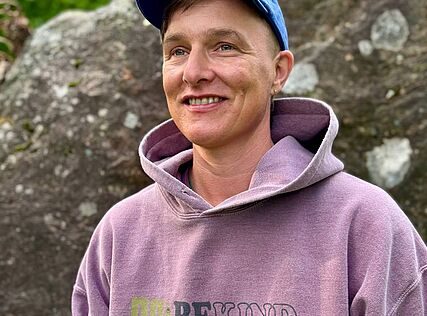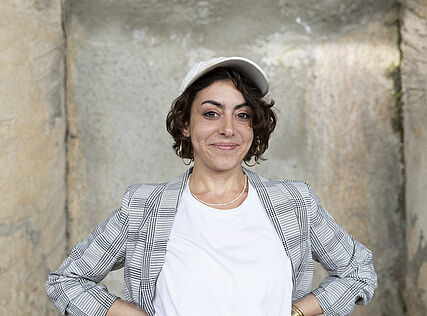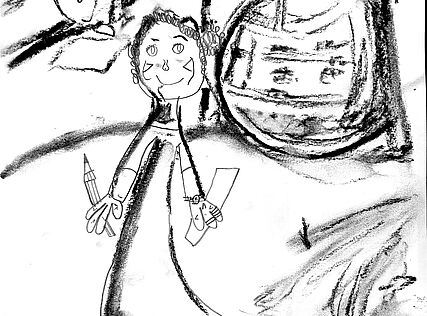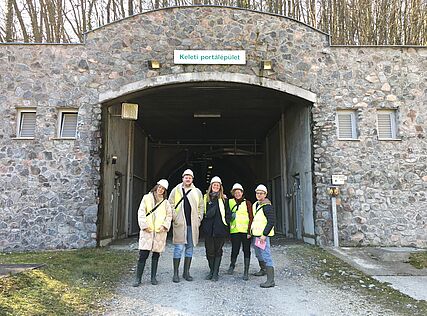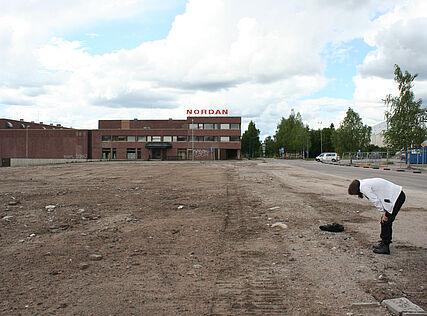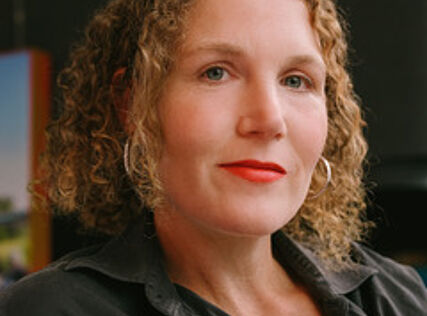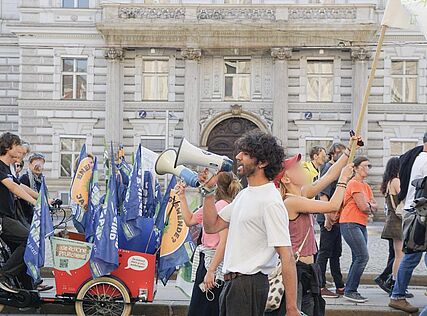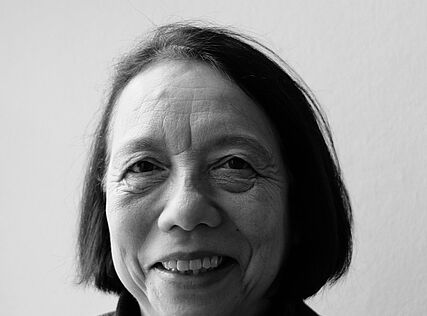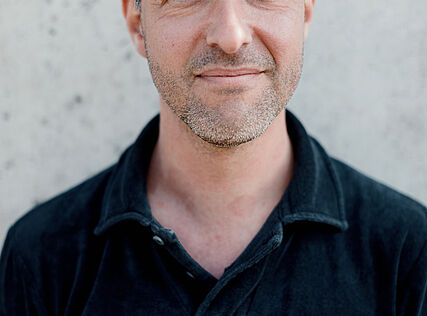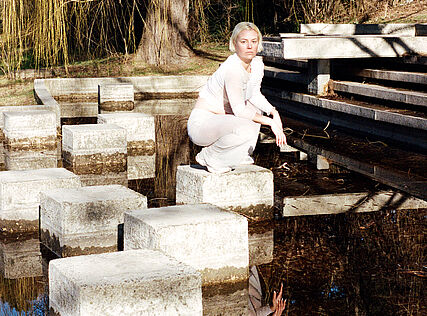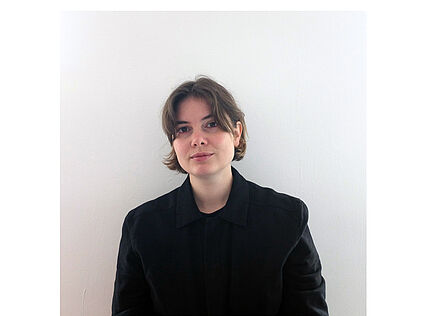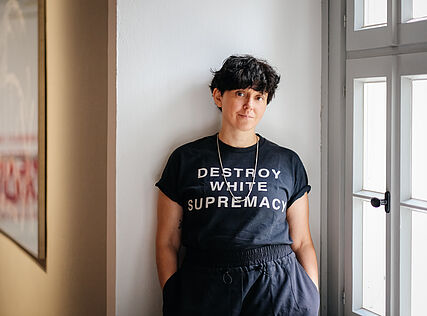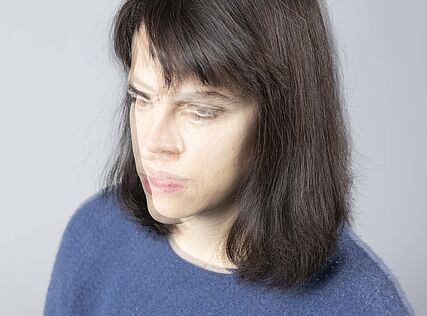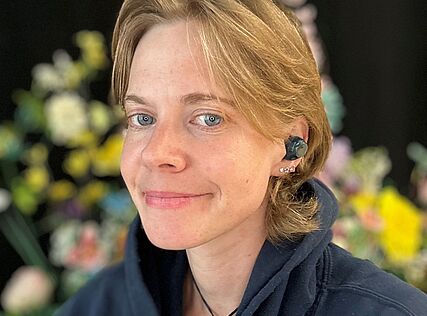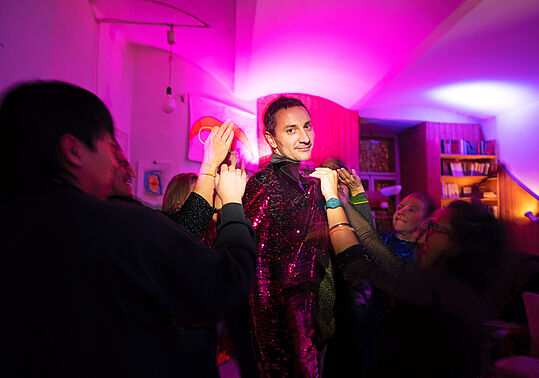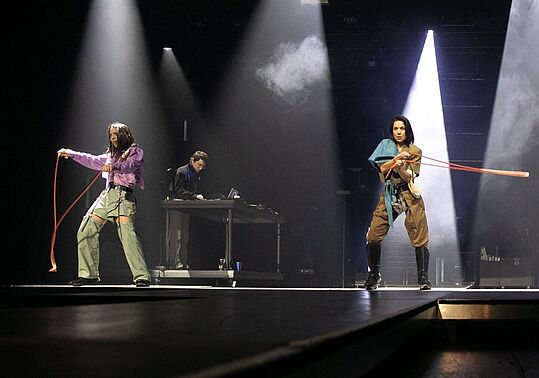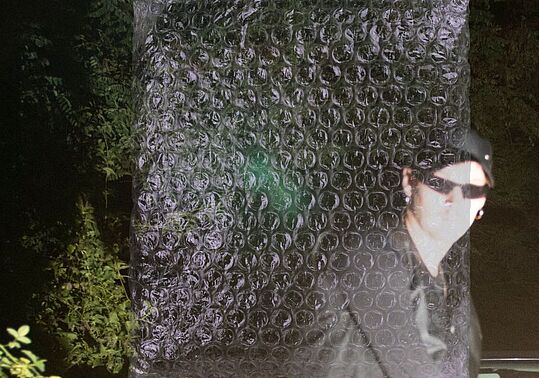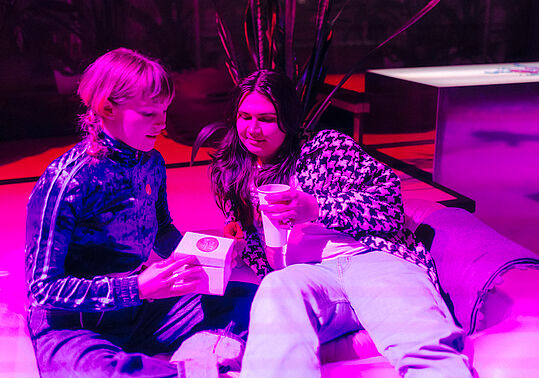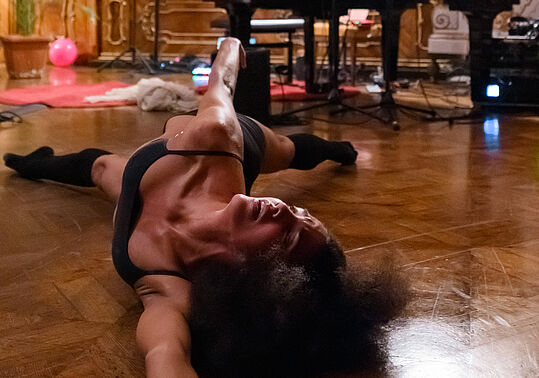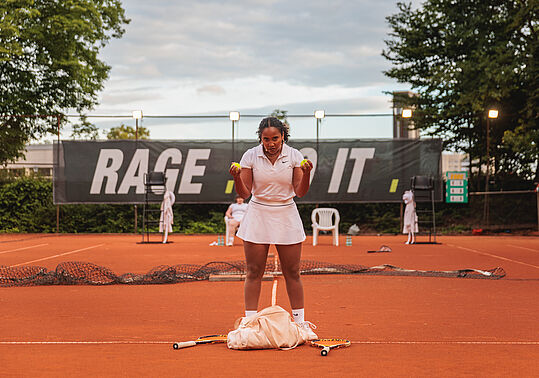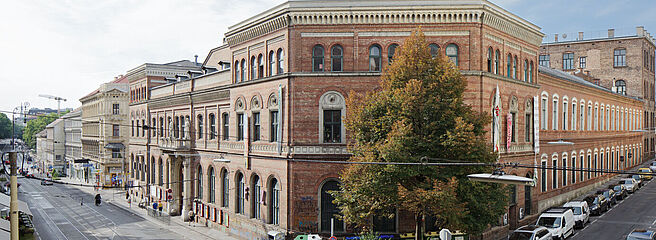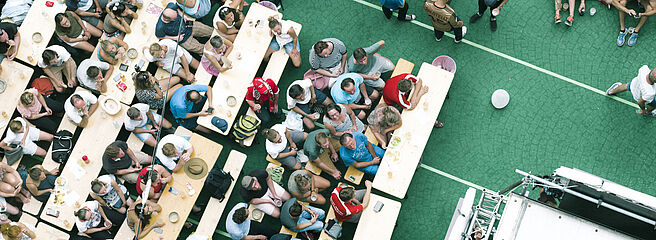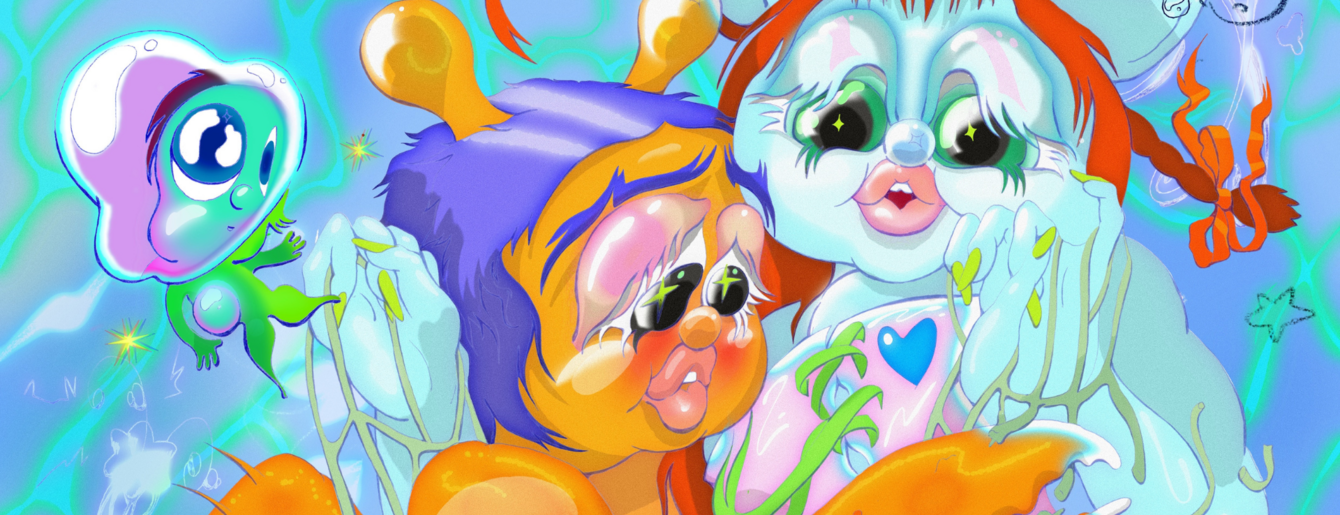
So 5.10.2025
11.00 - 21.00
Museum
A
Ecofeminist practices in art & activism - DAY 3
Das Symposium widmet sich aktuellen ökofeministischen Ansätzen in der Kunstproduktion, angesichts einer zerstörten und ausgebeuteten Welt. Unser Anliegen ist, entgegen autoritärer Repressionen, Orte zu beschützen, feministisch-diskursive Räume und soziale Infrastrukturen in Kunst und Kultur zu stärken und Austausch zu fördern. Das Symposium befasst sich mit Praktiken der Nachhaltigkeit und queeren Gegenerzählungen zu Ökozid und Formen der Gewalt. Wie können wir als politische Akteur*innen im Kunstbetrieb bestehende Allianzen stärken und was können wir in der aktuellen Situation für das künstlerische Arbeiten in Wien von ökofeministischen Ansätzen lernen?
Organisiert von Natalie Assmann, Sophie Lingg und Mir Raggam-Alji im Rahmen von DANUBE REQUIEM by RRRIOT – Verein zur Förderung und Vermittlung feministischen Kulturschaffens.
Programm TAG 3 – Sonntag 5.10.
11.00 – 12.00 Uhr
The Queer Fluid Body
hosted by Silk Graf
Bodywork Session
(in Deutscher Sprache)
Die Bodywork-Session "The Queer Fluid Body“ teilt inkorporiertes Wissen und öffnet einen Erfahrungsraum: Wasser als Hauptbestandteil des eigenen Körpers, Wasser als eines von Fünf Elementen, Wasser als emotionaler Informationsträger. Wir nehmen Kontakt auf zum fluiden Körper, kommen in Bewegung und erkunden Wege der Selbst-Regulation.
12.00 – 14.00 Uhr
The Sun will Rise from the South
Keynote by Epona Hamdan
(in Englischer Sprache)
During the 2024 war on Lebanon, white phosphorus was deployed by Israel in South Lebanon, in Beirut, and the Bekaa Valley. This act of environmental violence—a deliberate poisoning of land, water, air and the inhabitants of the terrain—raises the question on relationship with a land once it has been poisoned? What forms of practice can emerge when the soil is saturated with violence? And how must dominant Western frameworks of “sustainability” shift when solidarity must contend with chemically-altered terrains and ecologies that play out under occupation and war?
(The Western scientific paradigm has long sought universal truths in abstraction, often divorcing knowledge from place. But in many Indigenous, MENA, and African knowledge systems, material reality is inherently relational—never disembodied, never decontextualized. Toxicity, in this sense, is not merely a chemical condition, but a social and spiritual disturbance. In the wake of such disruption, new ontologies and technologies of survival, resistance, repair, and relation emerge.)
14.00 – 15.00 Uhr
Coffee break with the solar kitchen
hosted by Irene Lucas and Solarmanufaktur
(in Englischer Sprache)
15.00 – 17.00 Uhr
Re–narrating Extractivism through Feminist Friendships
Hosted by Karin Reisinger
(in Englischer Sprache)
Sharing knowledges of plants, making a fire in the snow, exchanging clothes and food, mourning together, hiking through the woods together, watching the news together, opening an exhibition together, embroidering and writing a text together, freezing together … This contribution discusses the feminist and ecofeminist friendships and long-term relationships that emerged in two different mining towns, Malmberget in Sábme/Sweden and Eisenerz in Styria/Austria. The encounters are motivated by architectural research, profession and education. And yet, the complementary and collaborative practices with local practitioners of activism, pedagogy, maintenance and survival form a much more complex puzzle of textual and audiovisual pieces that (re)shape narrations of extractivism.
Peripheries within and the search for eternal energy in SALT.CLAY.ROCK.
hosted byVirág Major-Kremer
(in Englischer Sprache)
In this talk, Virág Major-Kremer, member of the curatorial collective SALT. CLAY. ROCK, will share experiences, working methods and other stories from their artistic-curatorial research project that ran between the fall of 2022 and spring 2025. SALT. CLAY. ROCK. On Nuclear Pasts and Radiant Futuresexplored together with 9 artists the politics of nuclear power and the storage of radioactive waste. Through locally embedded research and new artistic productions, SALT. CLAY. ROCK focused on rural places in Germany and Hungary that host nuclear infrastructures such as uranium mines, power plants and waste repositories, or have been and still are important sites of anti-nuclear resistance. It investigated how nuclear industries and infrastructures affect our lives, delving into the production of nuclear energy and the storage of radioactive waste, and how it impacts the day-to-day reality of the local communities that coexist with these infrastructures, its consequences, as well as its looming yet invisible dangers. saltclayrock.ngbk.de/en
18.00 – 20.30 Uhr
Ökofeministisches Produzieren in den Freien Darstellenden Künsten
Diskussion
(in Deutscher Sprache)
Die Frage, wie theoretische Überlegungen zu nachhaltigem Produzieren in Projekten der Freien Darstellenden Künste konkret und praktisch umgesetzt werden können, wird uns am Ende dieses Wochenendes beschäftigen.
Kunst- und Kulturproduzent:innen stehen unter enormem Druck: im Spannungsfeld zwischen Kulturkürzungen und Austeritätsmaßnahmen, zwischen persönlichen und kollektiven Kämpfen gegen repressive und autoritäre Politik von rechts – und zugleich im alltäglichen Bemühen, faire und solidarische Strukturen sowie Inhalte zu schaffen für sich selbst und andere.
Der Begriff der Nachhaltigkeit ist ein weites Feld und muss daher diskutiert werden. Was bedeutet nachhaltige Kunstproduktion angesichts der Klimakatastrophe? Wie gehen wir mit Fragen der Mobilität, von Gastspielen, Förderstrukturen und Kulturpolitik um? Wie mit Materialien, Transportmöglichkeiten, Ressourcenverteilung und Kooperationen? Und schließlich: Wie können wir ökofeministische Überlegungen in unsere tägliche Arbeitspraxis integrieren?
Diskutiert wird mit Dorothea Trappel (Klimabiennale), Ertuğrul Bayraktar (Künstler und Aktivist), Monika Mokre (Politikwissenschaftlerin und Aktivistin), Maximilian Haas u.a.
20.30 – 21.00 Uhr
Expanding Consciousness – the art of intoxicants and other forms of consciousness expansion with catmint and natural wine
Wine by Sigi Resch sigiresch.at
About the artists
Silk Graf
Silk Graf (er/dey, pun intended) ist ein queerer Bodyworker in Wien, Shiatsu Therapeut, somatischer Yogalehrer, Persönlicher Assistent und Tanzworkshop Organizer im Bereich Mixed Abled Dance. Dey lotet seit vielen Jahren die Schnittstellen von Körper, Trauma und In-Der-Welt-Sein aus. Lauschend, Nervensystem-regulierend, fluide, auf der Suche nach friedlich-lustvollem Sein mit Selbst, Anderen und Welt.
Epona Hamdan
Epona Hamdan (she/they) is a German-Lebanese curator and producer based in Berlin. She is currently working as researcher and producer for the House of World Cultures (HKW) in sciences, digital and media practices. Her research centers around cosmo-techniques and land based practices in relation to the MENA Region and the Mediterranean. Epona studied History and Culture of Middle East, Theatre Studies and English Philology at Freie Universität Berlin as well as a specialization in Curation in Performing Arts at Paris-Lodron-University Salzburg. She has worked with Free Home University (Lecce, Italy), Oktoberdans Festival (Bergen, Norway), Spielart Theaterfestival (Munich, Germany) and Rimini Protokoll (Berlin).
Irene Lucas
Irene Lucas (sie/ihr)ist bildende Künstlerin und Gründerin des Start-ups Solarmanufaktur. Außerdem ist sie Mitbegründerin des Kunstraums ToZOMIA in Wien, Österreich. Als künstlerische Forscherin arbeitet sie an der Schnittstelle von Wissenschaft, Kunst und Technologie. Derzeit ist sie Lektorin an der Pädagogischen Hochschule Graz (Österreich) und untersucht in ihrer Arbeit mögliche Kontaktzonen und gemeinsame Territorien kritischer Kunstpraxis, wobei sie Methoden aus Natur, Kunst und Spielpädagogik experimentell miteinander verbindet.
solarmanufaktur.at
Karin Reisinger
Karin Reisinger (sie/ihr), architect, is a senior scientist at the University of Applied Arts Vienna. She also teaches at the Academy of Fine Arts Vienna, where she led the research projects Two Ore Mountains: Feminist Ecologies of Spatial Practices (2020-2024) and Stories of Post-extractive F*utures (2023-2024) (https://www.mountains-of-ore.org/). As a postdoc, she researched and taught at the School of Architecture/Critical Studies at KTH Stockholm (2016-17). Since then, she has been working with the town of Malmberget (which means ore mountain) in Sábme/Northern Sweden, and since 2020 also with the town of Eisenerz in the Styrian Alps in Austria.
Virág Major-Kremer
Virág Major-Kremer (sie/ihr) (Berlin) is a curator and art manager, with an academic background in international relations, art management and curating. She is currently working as Producer and Researcher in Science, Media and Digital Practices at HKW Berlin. She has worked internationally in the field of contemporary visual arts, from contemporary galleries, the Contemporary Architecture Center, the Vasarely Museum in Budapest to curatorial assistance at dOCUMENTA(13) and coordination in the Anthropocene Project at HKW Berlin. In her own curatorial practice she often concerned with education, developing informal formats for learning combining practical and discursive concerns. She was artistic director of The School of Free Printing (2015-2020), an informal artistic-civic educational project in Hungary based on methods of reform pedagogist Célestin Freinet, and the two-year project DemoLab (2018-2020). Especially passionate about artistic engagement with gardens and landscapes and the non-human, she edited the publication Reap and Sow (2015) and is co-author of the traveling exhibition and book TRANSYLVANIA RETOUCHED (2020).
http://www.mountains-of-ore.org/
Dorothea Trappel
Dorothea Trappel (sie/ihr) ist Künstlerin, Kuratorin und Kulturmanagerin. Derzeit zeigt sie sich mitverantwortlich für das zeitgenössische Kunstprogramm im öffentlichen Raum der Klima Biennale 2026.
Schon 2024 war sie maßgeblich an der Gestaltung der ersten Ausgabe der Klima Biennale Wien beteiligt und entwickelte das Kunstprogramm sowie die Ausrichtung mit.
Als Kuratorin, Autorin und Kunstmanagerin arbeitet sie an der Schnittstelle von Kunst und Ökologie mit den Fokusbereichen Klimagerechtigkeit, Aktivismus, Feminismus und Teilhabe.
Ertuğrul Bayraktar
Ertuğrul Bayraktar war in der Fischa-Au-Bewegung aktiv und wirkte bei der Organisation der Besetzung mit. Sein Aktivismus verbindet künstlerische Ausdrucksformen mit politischem Handeln und rückt so gesellschaftliche Themen ins öffentliche Bewusstsein.
Auf Instagram ist Bayraktar als @rote.memes_ bekannt. Dort nutzt er Kunst in Form von Memes, um gesellschaftliche Gegenwart kritisch zu spiegeln, oft mit einem selbstironischen Blick auf die Linke. Mit Humor vermittelt Bayraktar komplexe Umwelt- und Politikthemen und möchte Menschen dazu anregen, über gesellschaftliche Strukturen nachzudenken und selbst aktiv gegen Ungerechtigkeit zu werden.
Monika Mokre
Monika Mokre, Studium der Politikwissenschaft und Kommunikationswissenschaft an der Universität Wien. Seit 1991 wissenschaftliche Mitarbeiterin an der Österreichischen Akademie der Wissenschaften, bis 2008 am Institut für europäische Integrationsforschung. Seit 2009 Mitarbeiterin des Instituts für Kulturwissenschaften der ÖAW, Lehraufträge am Institut für Kulturmanagement und Kulturwissenschaft der Universität für Musik und darstellende Kunst, an der Universität für angewandte Kunst und an der Webster University Vienna. Vorsitzende von eipcp, european institute for progressive cultural policies, Mitglied des Executive Committee von ror-n, Refugee Outreach & Research Network, Mitglied des Center for Research on Democracy and Law, Thessaloniki, Mitglied des Betriebsrats der ÖAW.
Maximilian Haas
Maximilian Haas ist Professor für Performative Studies und Medientheorie an der Hochschule für Angewandte Wissenschaften Hamburg. Forschungsschwerpunkte umfassen u. a. Performance- und Tanz-Dramaturgie, künstlerische Forschung und ästhetische Epistemologien, nicht-menschliche Akteure und mehr-als-menschliche Ästhetik, Betriebsökologie und nachhaltige Produktionsweisen, Science and Technology, Animal und Environmental Studies. Zudem war Haas als Dramaturg und Kurator im Stadt- und Staatstheater sowie in der Freien Szene engagiert. Im Zuge einer empirischen Studie für die bundesdeutsche Kulturförderung erfolgten Weiterbildungen zum Nachhaltigkeits- und Transformationsmanager.
Team
Natalie Assmann
Natalie Assmann (she/her) ist Künstlerin, Regisseurin und Kuratorin. Ihre Praxis bewegt sich im Feld der interdisziplinären Performance und versteht sich als Forschung nach posthumanistischen Konzepten des Zusammenlebens und widerständigen, queer-feministischen sowie antifaschistischen Ästhetiken in der Kunstproduktion;
Assmann´s Arbeiten und Kollaborationen wurden u.a. am Tanzquartier Wien, brut Wien, Schauspiel Köln, Volksbühne Berlin und beim Impulse Theater Festival NRW gezeigt. 2019/20 war sie Co-Leiterin der WIENWOCHE, zuletzt arbeitete sie intensiv am Wiener Kongress “The Art & Abuse” der Wiener Festwochen. 2022 erhielt sie das Arbeitsstipendium der Stadt Wien; Veröffentlichungen und Features erschienen u.a. im Missy Magazin, Grau Magazin und in dem feministischen Magazin an.schläge.
Aktuell entwickelt Assmann gemeinsam mit Vertrauten und Mitstreiter:innen ein Projekt über die Donau (Premiere: April 2026, WUK performing arts). Sie lebt mit ihrer Partnerin und ihrer Hündin zwischen Wien und Berlin.
Sophie Lingg
Sophie Lingg (sie) forscht, experimentiert und organisiert zu Digitalität, digitalen Medien und deren Nutzung für queer-feministisches, künstlerisches Arbeiten und Kunstvermittlung sowie zu Ökofeminismus, öffentlicher Raum und dessen Nutzung. Sie schreibt ihre Dissertation über künstlerische und künstlerisch-aktivistische Arbeit in sozialen Medien (betreut von Elke Krasny). Sie ist Mitherausgeberin des FKW-Journals Feminist Infrastructural Critique. Life-affirming Practices Against Capital (Nr. 74; 2024) sowie Radicalizing Care: Feminist and Queer Activism in Curating (London, Sternberg Press, 2021). Sophie war Teil des Erasmus+-Forschungsprojekts Digital Didactics in Art Education, didae.eu.
Mir Raggam-Alji
Mir Raggam-Alji ist Künstler*in, Filmemacher*in und Kunstvermittler*in, deren Arbeiten sich aus einer queeren, postmigrantischen Perspektive mit antirassistischen und queerfeministische Fragestellungen auseinandersetzen. In der künstlerischen, forschenden und vermittelnden Praxis beschäftigt sich Raggam-Alji mit der kritischen Sichtbarmachung und Analyse tiefgreifender hegemonialer, patriarchaler, weißer Machtverhältnisse und den damit verbundenen Mechanismen gesellschaftlicher Marginalisierung und Ausgrenzung. Diese Reflexion prägen Raggam-Aljis Arbeit und spiegeln deren konsequente Haltung gegen strukturelle Ungleichheit wider.
Raggam-Aljis Arbeiten wurden mit Preisen und Stipendien, wie dem Volkswagen Group Fellowship 2024, dem lime_lab Preis für transdisziplinäres Hörspiel und dem Preis der Akademie der bildenden Künste Wien ausgezeichnet.
Sattva Caru Giacosa
Sattva Caru Giacosa (born in Bailadores, Venezuela; lives and works in Vienna, Austria) The intersection of photography, performance, and installation forms the core of her artistic approach, through which she addresses social themes such as the female body, migration and representation. Drawing on her own post-migratory experience, she examines the tension between hypervisual politics and desensitisation to images, critically engaging with the hierarchies inherent in visual narratives. Using photography as an imaginative medium, she creates historical documents and affective cartographies, focusing on the body as a socio-political territory -- a map of displacement, exodus and exile. Sattva teaches photography, visual narratives and writing, emphasising critical thinking about image-making, the gaze and storytelling.
Charlie Spies
Sattva Caru Giacosa (born in Bailadores, Venezuela; lives and works in Vienna, Austria) The intersection of photography, performance, and installation forms the core of her artistic approach, through which she addresses social themes such as the female body, migration and representation. Drawing on her own post-migratory experience, she examines the tension between hypervisual politics and desensitisation to images, critically engaging with the hierarchies inherent in visual narratives. Using photography as an imaginative medium, she creates historical documents and affective cartographies, focusing on the body as a socio-political territory -- a map of displacement, exodus and exile. Sattva teaches photography, visual narratives and writing, emphasising critical thinking about image-making, the gaze and storytelling.

